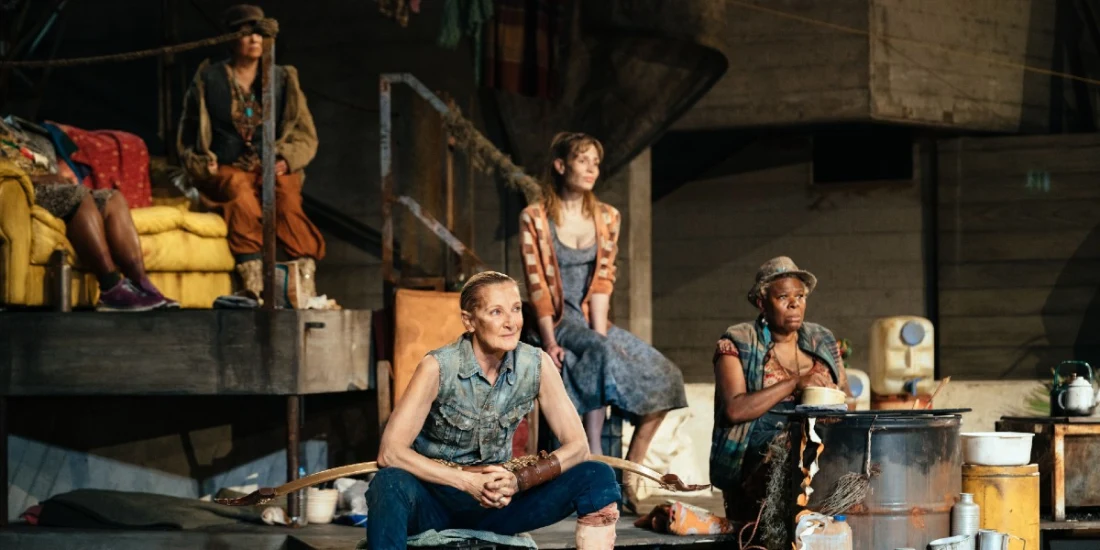Sophocles rewrite ‘Paradise’, starring Lesley Sharp, is brave, bold, and bruising
This summer's barrage of theatre openings comes to an unexpectedly heady climax with Paradise, the poet and polymath Kae Tempest's brave and bruising modern-day adaptation of Sophocles's Philoctetes. Marking the first show in 18 months or so to open at the National Theatre to full capacity, Ian Rickson's production reminds us of this director's singular gift for theatrical transliteration and, indeed, translation, as reflected in his magnificent revival at this same address a few years ago of Irishman Brian Friel's great Translations.
Paradise is an altogether knottier offering: an interval-free, all-female retelling of the story of the pained military hero, Philoctetes, who is required by Odysseus (whom he loathes) to return to the military fray in order to fulfil a prophesy about winning the Trojan War. That task means wooing this onetime warrior away from the island upon which he has been abandoned for a decade and left to a feral, cave-like existence that is more or less solitary except for the presence here of a remarkably individuated chorus, each of whom has a specific take on the primal situation unfolding in their midst. And while Greek tragedy is Tempest's obvious influence, Chekhov gets a look-in, too, whether in Philoctetes's Vanya-esque awareness of what else he might have been were he not derailed by illness or in the passing mention of shooting a seagull: Rickson, indeed, directed the finest production of The Seagull I have seen.
The forbidding marketing campaign for Paradise shows a close-up photo of a drawn-looking, wracked Lesley Sharp, here cast as Philoctetes and an image that suggests an evening of medicinal theatre that might be good for you but isn't necessarily going to be much fun. In fact, Paradise turns out to be tonally far livelier and more varied than one might expect - merciless in its (accurate) critique on the cesspit of a world we inhabit (the play's title is belligerently ironic), yet shot through with necessary bursts of humour so as to lighten the mood. Possibly my single favourite line of the theatre year so far comes when Anastasia Hille, in thrillingly guttural form as Odysseus, announces "I am not a fucking pizza" (!) - this in response to talk of the presence on the island of wild garlic, amongst the various comestibles keeping Philoctetes alive.
Rickson, to his credit, has found a way for Hille, Sharp, and Gloria Obianyo, as Achilles's son Neoptolemus, to embrace the machismo of their parts without getting trapped into playing the accents at the expense of character - though I will admit to being distracted at the start by Sharp's aural resemblance to the actor Ray Winstone. The three leads acquit themselves beautifully in various face-offs that turn Tony winner Rae Smith's set into a gladiatorial arena well before one of these men is seen to urinate on another.
Sounding as if the language is being scraped from the throat, Hille forsakes the soft-spoken quality for which she is known to locate the nihilist in Odysseus, who holds forth on a time when there is "nothing left to fight for." And as a former "beast, a machine," Sharp gives a career-capping performance as a survivor who has eked out a hardscrabble life that may just possibly not be worth it, given the bleak reality of the world at large as enumerated in multiple passages whose modern-day resonances are there for the taking. (Tempest is especially acute when it comes to the craven leadership that society has these days allowed access to power, to our collective detriment.)
There's an element of the meta to proceedings, as one or another choric figure speaks of "getting to sit and watch the show," the goings-on framed by the searing and beautifully sung presence of ESKA, the British singer-songwriter who is co-composer on Paradise alongside Oscar-winner Stephen Warbeck (Shakespeare in Love). And among an altogether first-rate line-up of choric players, it's especially wonderful to encounter Naomi Wirthner, whose Yasmeen shares with Philoctetes a long and lingering kiss.
Such sudden affection proves the exception, not the rule, in the baleful climes of a play whose unflinching dystopia finds a provocative echo in Jerusalem, the modern-day masterwork by Jez Butterworth which this director will revive on the West End next spring. I'm not sure how Rickson makes it through the day given the unflinching view of humankind in the plays to which he is drawn, though one can point to a self-saving resilience common both to Mark Rylance's iconic Johnny "Rooster" Byron in Jerusalem and the take-no-prisoners Philoctetes proffered by Tempest. But I would imagine that no matter the unforgiving nature of the landscape on view, Rickson, like all of us, finds compensation and reward aplenty in the nourishing value of art.
Paradise is playing at the National Theatre until 11 September.
Photo credit: Lesley Sharp, Amie Francis and Sutara Gayle in Paradise (Photo by Helen Murray)
Originally published on
